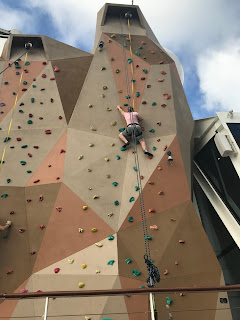Sometimes we get ourselves in trouble, and sometimes all it takes is a few good men or women to help us get out.
Our friends from Cleveland came East for a visit last weekend. The nine of us decided to go on a booze cruise around Casco Bay. Booze and music, that is. I confirmed over the phone that the ship was wheelchair accessible, including an elevator between the two decks.
At 7:30, after a nice dinner at Sebago Brewing Company, we boarded the Bay Mist, one of the ships operated by Casco Bay Lines. We decided the best place to hang out would be on the upper deck. One of the crewmembers came by and said he would operate the wheelchair lift for me. He opened the door, and I drove in. My Permobil wheelchair barely fit. There was no room for another passenger.
I started inching up. About two feet shy of the top floor, the lift stopped. Oh crap.
The crew and Kim communicated with me through the glass window at the top door and via cell phone. Not to worry, they were working on the problem. It started to get warm in the elevator. I didn’t feel claustrophobic, per se, but I did want some fresh air.
After about ten minutes, the elevator began moving again, and I exited onto the top floor, no worse for the wear.
We had fun on the top deck — watching the sunset, sipping on cocktails, and enjoying one another’s company. Then I heard my phone ring. Who was calling? Nature, of course.
“Kim, I need to use the bathroom.”
“The only bathrooms are on the lower deck.”
We decided that, because of potential problems with the lift, when we reached the lower deck we would stay there for the rest of the three-hour cruise.
The ship’s crew helped me down to the lower deck. The lift performed well with gravity on its side. I used the bathroom, and then we surveyed our surroundings. We didn’t want to be there. I decided to take a chance with the lift and go back upstairs.
Again, things worked well until I was about two feet shy of the upper deck, at which time the lift came to a stop. On this occasion, however, the crew couldn’t get it going again. After about 20 minutes, I told Kim over the phone, “It’s getting hot in here. Let’s just have them take me back down to the lower deck.”
Nice plan Mitch, but this time the lift wouldn’t go up or down. I was stuck.
Fortunately, the crew figured out how to open the elevator door at the top and let fresh air in. I was comfortable, and not panicked at all, but I was still stuck in an elevator. My friend, Dawn, kept me lubricated with rum and cokes, and I made the best of it.
The crew was pleasant and helpful. While they kept troubleshooting the electronics, we discussed plan B. A group of four men, a.k.a. a few good men, with experience in the Armed Forces and the fire department, had volunteered to lift me out by hand if necessary. I didn’t want to be lifted out. It would probably hurt. I’m a big guy.
So, I encouraged the team to keep troubleshooting the motor and switches. After having been in the elevator for about an hour, I said, “Okay, give this one more try, and then call in the extraction team.”
My people found the few good men and asked if they were still willing to help out. “Hell yes,” they responded, ready for action.
On one of the earlier attempts, a crewmember had been able to pull up on a handle inside the elevator as we tried to run the motor, and we gained an inch or so of elevation. But this crewmember wasn’t a big man. With the few good men standing in front of the elevator waiting for their chance, I asked the strongest looking one if he would pull up on the elevator as we made this final attempt. He did, and all we gained was another inch.
“Let me try one more time,” the big guy said.
Again, we slowly gained an inch and then something happened. The muscles in his forearm rippled. His face turned red. The elevator began moving upward again, completely under his power. I rolled out onto the upper deck to the applause of my friends, the crew members, and the few good men.
Because of the change in tides, we disembarked from the top deck, and the rest of the evening was uneventful.
On Monday, when I spoke to the people at Casco Bay Lines they were very apologetic and explained that this was an old “screw type” lift, whereas all their other boats were equipped with hydraulic lifts. I will not go on the Bay Mist again unless they upgrade it. Casco Bay Lines agreed to refund the money for our entire group of nine people.
Sure, if I had been in my iBOT wheelchair, we would have used the stairs, but I certainly should have been able to enjoy this evening in my Permobil. Situations like this are completely avoidable. Lifts need to operate up to capacity, in a reliable way. That said, everyone who assisted me remained cool and calm. No tempers flared. We all worked toward the common goal of getting me out of the elevator. Thanks to a few good men, and one in particular, we succeeded.
I keep getting into trouble when I leave the safe confines of my home, but I’m not going to stop quite yet. There’s too much to see, too many fine people to meet, and too many adventures to experience.













































